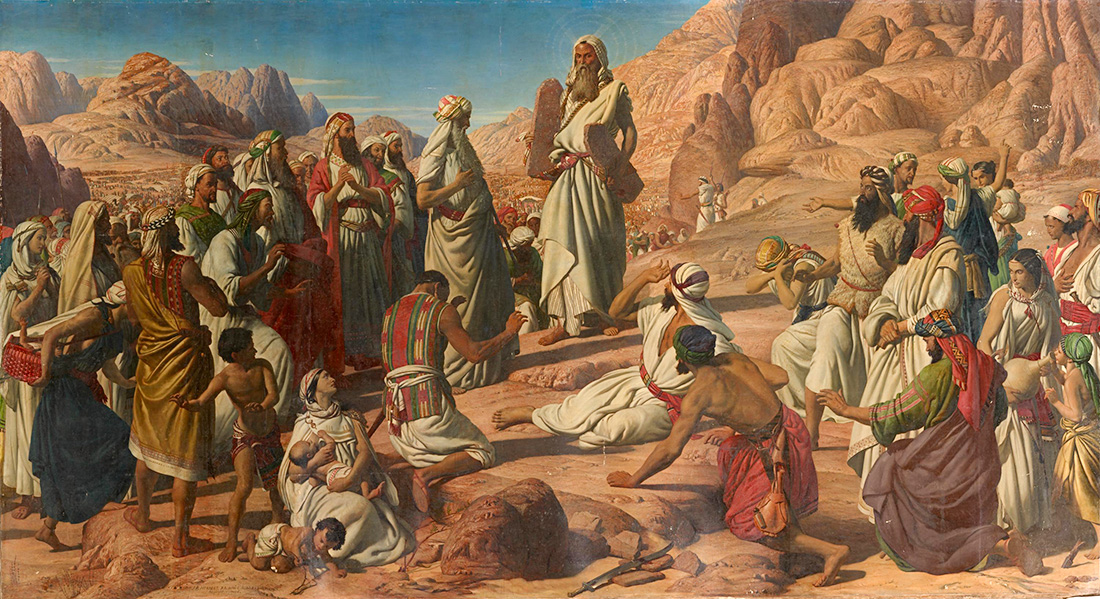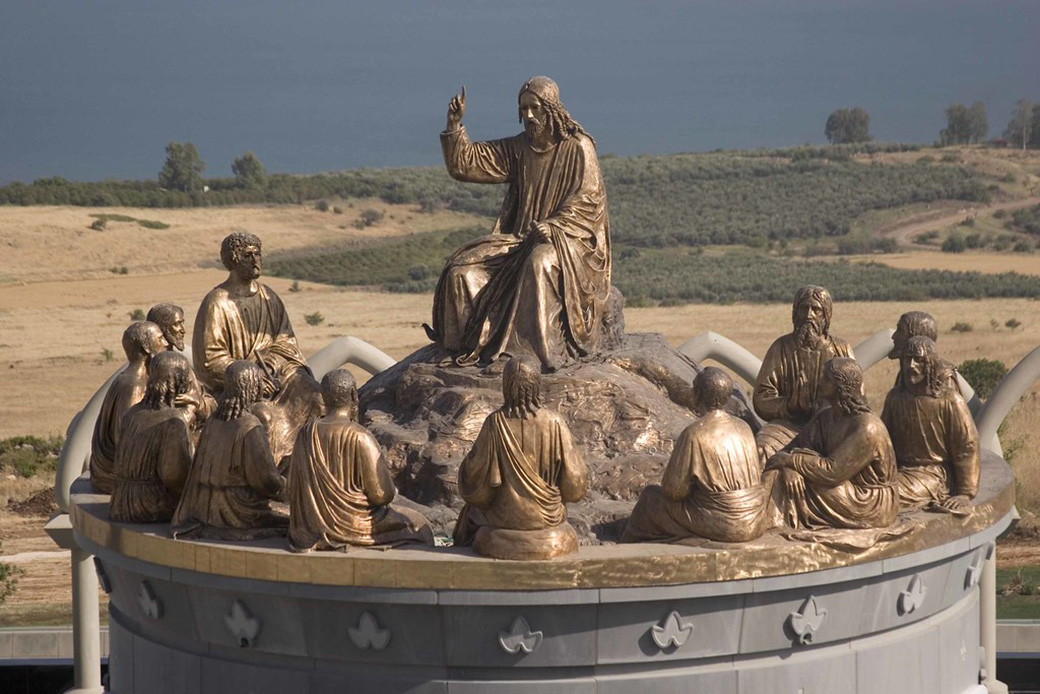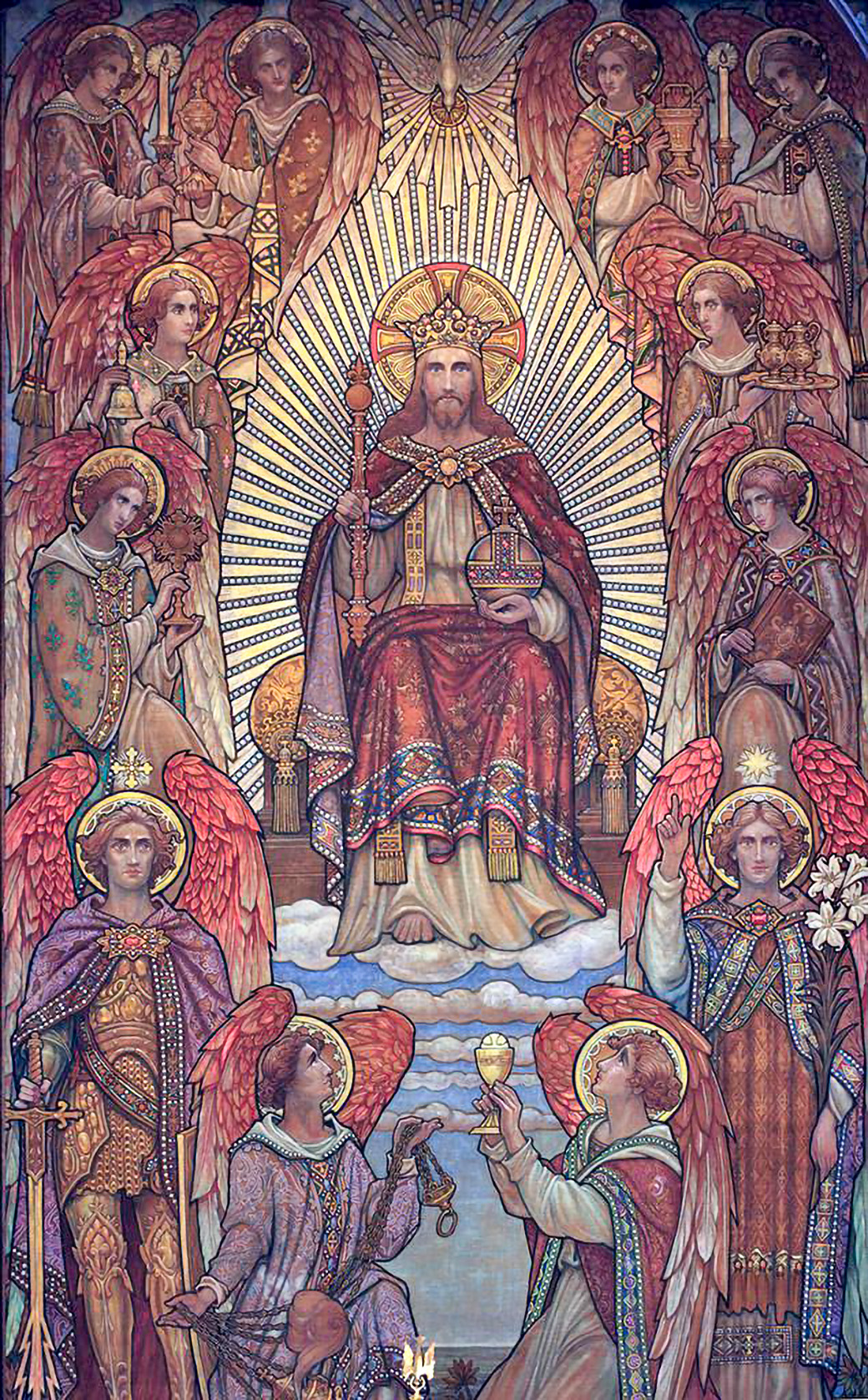Wednesday in the Third Week of Lent: Deuteronomy 4:1, 5-9, Matthew 5:17-19.
Today’s readings show Moses and the new Moses (Christ) discussing God’s law and urging their listeners to not only obey it but teach it to future generations. Jesus’s words occur during the Sermon on the Mount when he shares the Beatitudes, and they are a powerful claim on his Kingship.
Once chosen by God, Moses seems to be in near-constant communication with Him. I’m sure that’s not quite true, but when reading Exodus and Deuteronomy, I’m struck with just how much the two of them spoke. The Word of God is not only with him verbally, but eventually on “tablets of stone, written with the finger of God” (Ex 31:18). The Word is extraordinarily active, first as prophecy bringer, then miracle worker, deliverer, satisfier of human needs, and finally, upon Mt. Sinai, law-giver. God continues to reach out to his people, manifesting his presence as a response to their incapacity to recognize and hold Him in their hearts. The law written on stone tablets is a capstone on his work establishing the nation of Israel, rescuing them from enslavement.

Laws on stone tablets (not to mention the much more extensive precepts given to Moses verbally) seem fairly final in their permanence, but God’s aim is to inscribe His law on the hearts of His people. Indeed, while He’s inscribing the first set of stone tablets, the Israelites are busy building and worshipping a golden calf at the base of Mt. Sinai. Clearly, God signifies the importance of His law but His people seem unable to grasp it. He eventually gives Moses a second set of tablets after Moses smashes the first ones in his anger and shock over the Israelites unfaithfulness while he was on the mountain for 40 days and nights.
So today’s reading shows Moses imploring God’s fledgling people not to forget (again) God’s works, providence, and laws. After stressing God’s laws and decrees, Moses tells them “not to forget the things which your own eyes have seen, nor let them slip from your memory as long as you live, but teach them to your children and to your children’s children.” Like God, Moses understands that the laws must be inscribed in their memory and on their hearts, not just on stone tablets.
Moses spends the bulk of the Book of Deuteronomy teaching them the laws and decrees. At one point, though, he summarizes the multitude of prescriptions: “what does the Lord your God require of you? Only to fear the Lord your God, to walk in all his ways, to love him, to serve the Lord your God with all your heart and with all your soul, and to keep the commandments of the Lord your God and his decrees” (Dt 10:12-13).
We see over time that the Israelites struggle with both keeping both the letter of the law and the spirit of the law. Jesus enters history at a time when the Pharisees and scribes are experts in the letter of the law but do not uphold the spirit of the law. Jesus points out that they have ended up fetishizing the law, as demonstrated by their physical appearance: “they make their phylacteries broad and their fringes long” (Mt 23:5). Phylacteries are boxes affixed to the head and left arm that contain slips of paper with scriptural passages. The tassels on their clothing were commanded in the Book of Numbers by God to be worn as a reminder to keep his commandments. They take these devices meant to remind a person to turn inwardly to God and make a show of them, boasting outwardly that the law resides with them.
Today’s gospel reading marks how Jesus reconciles, joins, and perfects the letter and the spirit of the law in Himself. It comes shortly after the Beatitudes, towards the beginning of the lengthy Sermon on the Mount. Let’s imagine the excitement in the air with the crowds gathered around Him, the Sea of Galilee the backdrop for a miracle worker preaching with authority.

The Beatitudes seem to turn everything on its head. Blessed are the poor in spirit, the meek, the merciful, the peace makers — all figures of weakness who are guaranteed the earth and the kingdom of Heaven. Many who were listening may have thought this was a new revelation, perhaps the beginning of a new sect of Judaism. But, as Erasmo Leiva-Merikakis points out, “Jesus likewise surprises everyone by here defining himself over against mere religious anarchists and innovators, all those who would in fact invent on the spot a religious ‘tradition’ that is nothing more than a projection of their own frustrations, opportunism, political programs, and spiritual arbitrariness, often masquerading under the names of ‘mysticism’ and ‘spiritual authenticity'” (Fire of Mercy, Heart of the Word, Vol I, p. 211).
Jesus surprises everyone by stating, “Do not think that I have come to abolish the law or the prophets; I have come not to abolish but to fulfill.” Contrary to that Baby Boomer we know at our church who always says, “Jesus was the first hippy,” he most definitely was not. He is not anti-establishment for the sake of disrupting social order. He is not just preaching peace, love and joy (although these are aspects of his teaching). He is the Law (it’s fulfillment in fact) and He is the Spirit. His being and ministry unite these seemingly disparate but actually unified things.
When He says, “I have come,” He speaks not of coming to the mountain or coming to Galilee, but of coming in the more general sense, coming to earth. He refers to his purpose. It is an astounding message for the Jews who were listening and a good reminder for us now. Everything that they have founded their nation upon, from Moses and the Ten Commandments to the finicky rule-following of the Pharisees in their own time, is being fulfilled by Jesus. Not added onto, not adjusted, not clarified, but fulfilled. Either this was a seriously self-deluded man or it was God Himself. The mystical realities presented in the New Testament prove the second option.
There is something new about His Word, but he is careful to point out that this newness is a fulfillment, not a breaking with the law that has been established. A megalomaniac savior figure would likely have wanted to start his own cult, but as we realize that Jesus is the Word of God, this is preposterous. He does not propose a schism or something “better.” The New Covenant (which is Christ Himself, body, teaching, and Spirit) is offered to us from God like the other covenants, superseding the ones that came before, but from the same originator (see the reflection The Difficult New Covenant of Love for more discussion here).

Why do both of today’s readings speak of our participation in teaching the law? Moses urges his people to teach all future generations about what they hear and see. Jesus goes a step further and says, “whoever obeys and teaches these commandments will be called greatest in the Kingdom of heaven.” To answer this, let us ponder the nature of the Word of God.
Just as God is characterized by the fullness of all that is good (see yesterday’s reflection, Mercy is the Master Principle), implicit in the Word of God is that fullness in communication. It is at once declarative, imperative, exclamatory, and even interrogative in its request to have us comprehend. It engages us wholly, it elicits a response (in prayer, in study, in action).
Also, when we say that the Word of God is given to us for our own benefit, this has many layers of meaning. It benefits us on a physical level by ordering us correctly in relation to one another, enabling just dealings and charity for all to live. It benefits us on a moral level, ordering our actions to the good rather than the evil, and leading us towards salvation. Finally, it benefits us on a spiritual level by uniting us with its author, God. Every benefit requires us to participate with it, however.
The Word lives organically in our world both because of its nature as being the fullness of communication and because God deemed that we should have free will and choose to interact with Him of our own accord. When we do interact with God through his Word, it lives in us (precisely by ordering us for physical, moral, and spiritual well-being). We become caught up in the Word, intertwined with the Word. What could be more satisfying as a human being than to be lifted into higher graces and levels of being than to be intertwined with the Word of God?
Here’s the great bit: in a spiritual symbiosis, we engender more life for the Word of God in our world when we teach it to others. At the same time, the Word strengthens us and brings us closer to its author. God does not need us to do this work — it’s not as if the Word of God would somehow peter out if we stopped teaching it — but this is the great vocation God has granted us. It is part and parcel of his injunction to share His mercy and charity throughout the world (again, see yesterday’s reflection). Like granting others mercy and performing acts of charity, our very act of teaching lifts us spiritually, delights God on a visceral level, and brings us closer to Him. That is why Jesus says, “whoever obeys and teaches these commandments will be called greatest in the Kingdom of heaven.” Obeying and teaching is the union of the letter and spirit of God’s law in us.
Additionally, to be able to teach something the way Jesus does means that you more than understand the Word; you are living with the Word and therefore setting a living example of the teaching. This is why Jesus gets so upset with the Pharisees, who pose as the ultimate teachers but have somehow removed living the Spirit of the law from knowing the letter of the law.
Jesus is the fulfillment of the law that He, the Word of God, first spoke to Moses, precisely because he can live it perfectly. He is rightfully seen as our King. Every word and act He performs on earth is pregnant with the depth of God’s message for us.

It is worth reflecting upon the awesome glory contained in our God-and-man Jesus Christ. To have your purpose be the very fulfillment of the law and covenants God has made with humanity! To become a suffering sacrifice for the entire human race, offered as the means to rescue us from the slavery of death and sin! To become a sacrament in body and Spirit! Did Mary have an inkling of this when she accepted the Incarnation given to her? Jewish women of her time were primed with the sure knowledge that one of them would bear the Messiah to the nation, but to have it come about in humbleness and end in seeming humility, only to burst forth in the liturgy of true communion with God … what a strange king! He leads us to a wholly different land with wholly different goals, but He is the truest King the world will ever know.
Pingback: The Lord's coming is As Certain As the Dawn